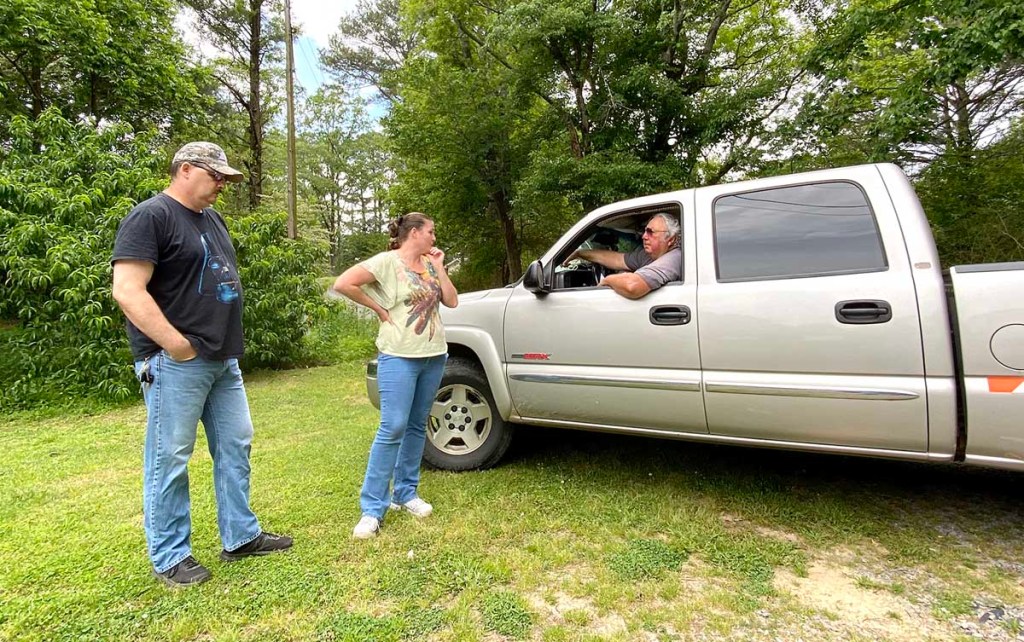The business of bandwidth
Published 5:15 am Saturday, May 16, 2020

- Debra and Glenn Miller chat with Baileyton Mayor Johnny Dyer at their home Wednesday. “There are just certain areas they (internet providers) don’t want to invest in unless it’s widely populated and they just don’t want to spend any money on towns that don’t have but a few people in it. They want to use the big towns and the most populated areas,” said Dyer.
In many ways, internet access has moved beyond a luxury to a necessity.
Happy Homes Realtor Wes Warren said he’s had homebuyers walk away from a sale over lack on internet access. And his colleague Jeff Dockery said it’s a common concern for buyers. “Internet access is just like electricity. Modern day living requires it from those who work at home on the computer to streaming what you watch on tv. We are asked early on whether an area has good internet service,” he said.
Trending
Providing internet access doesn’t come cheaply, though.
Baileyton resident Glenn Miller’s home is 2,000 feet from a Spectrum repeater, which could provide them with internet. But, for the company, “the cost outweighs the benefit,” he said.
“What it boils down to is money. Spectrum can not move into the area; they’ve actually looked into it but the cost would be far outweigh the benefits for them.”
Miller has more than 20 years experience in the telecommunications industry in Huntsville and used his expertise to crunch numbers on what it would take a telecommunications company to expand. The price: $50,000 per mile. “And that’s not counting if they have to cross roads,” he said.
Greg Fender, whose company negotiates with telecommunications companies on behalf of local governments throughout the Southeast, including Cullman, said Miller’s calculations sound on-point to him.
“I think that’s an accurate figure,” he said. “And $50,000 a mile, and x number of homes, it’s really hard to get your return on that money.”
Trending
For AT&T, specifically, he said, “They are totally focused in every facet of their business on a return in investment, so they’re not going to spend capital. They may spend federal grant money if they have it, to run to a rural area but they are not going to invest their capital. They just can’t. They’ve got to have a return on their investment. And I’m not trying to cast a stone on them; if I were a private business person, I wouldn’t either.”
Spectrum and AT&T won’t reveal for competitive purposes the number of homes they serve in areas, but both say they’re committed to expanding their rural networks.
AT&T spokesperson Kelly Layne Starling said, “We are committed to connecting our customers whenever they want and wherever they live. In fact, more than 390,000 customer locations in Alabama have access to AT&T Fiber. And through our participation in Connect America Fund Phase II, an FCC program, AT&T Alabama will offer high speed internet access to nearly 67,000 homes and small businesses in mostly rural areas across Alabama by the end of this year. Today, Fixed Wireless Internet is available in parts of 42 Alabama counties, including Cullman County serving customers in: Baileyton, Bremen, Crane Hill, Cullman, Hanceville, Holly Pond, Logan and Vinemont.”
Spectrum serves around 574,000 customers in Alabama and has extended it’s network over the past two years, including more than 350 locations in Cullman County in 2019 according to spokesperson Patti Michel.
“Spectrum is committed to providing faster and better broadband to more Americans in urban, suburban and rural areas. Since 2015, we’ve invested nearly $40 billion in our infrastructure and technology. These investments have enabled us to expand the reach of our fiber-rich network and allow us to deliver fast and reliable broadband to customers in urban, suburban and rural communities across America.”





